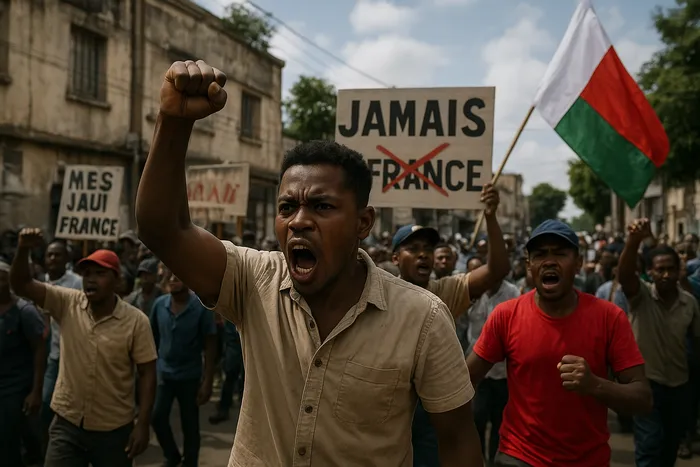“France out”: Madagascar’s protesters expose a wound that never healed

Image: INTERNAL
The recent protests in Antananarivo, featuring placards declaring "France out" and "Rajoelina and Macron out," highlight more than just opposition to the current president and his perceived connections to Paris. These demonstrations reveal a deep-seated and enduring sense of hurt, suspicion, and resentment within Malagasy political culture, stemming back centuries. The message is clear: the Malagasy public is not only rejecting Andry Rajoelina but also the lingering specter of France, which many believe continues to behave like a colonial power.
A twist in the political crisis
A series of dramatic events has fueled suspicion in Madagascar. Following weeks of public protests sparked by water and electricity shortages, and widespread frustration over corruption, an army unit known as CAPSAT declared its support for demonstrators demanding President Rajoelina's resignation. The president's whereabouts became unclear, prompting the National Assembly to initiate impeachment proceedings against him for desertion of duty.
Rumours quickly spread that Rajoelina had been evacuated on a French military aircraft, a claim that France has neither confirmed nor denied. In the midst of this turmoil, many observers interpreted a presidential pardon granted to two French nationals imprisoned in Madagascar as a tacit agreement. The anger sparked by these events extends beyond Rajoelina's governance and his French connections, touching upon the enduring legacy of a post-colonial relationship widely perceived as neocolonialism.
Memory as burden and weapon
To outsiders, anti-France sentiments in Malagasy protests might seem like mere emotional outbursts. However, for many Malagasy people, these expressions are a stark reminder of historical injustice and a wound that has yet to heal. Madagascar gained independence in 1960 after decades of French colonial rule. A particularly dark chapter in this legacy is the suppression of the 1947 uprising, where an estimated 11,000 to 40,000 Malagasy were killed. The brutal crackdown involved mass executions, torture, the burning of villages, and collective punishments. For many, the trauma of these events continues to echo through generations.
France has yet to fully acknowledge its colonial past. Despite President Macron's visit to Madagascar in April 2025 and his proposal for a Franco-Malagasy commission to investigate colonial atrocities, many Malagasy remain skeptical that such symbolic gestures can truly heal the deep wounds. This skepticism is fueled by the continued French involvement in core sectors of Madagascar's economy, such as energy, infrastructure, and mining, through capital or contracts. Furthermore, the experiences of young Malagasy workers in French call centers, who report demeaning treatment and low wages, vividly highlight the enduring legacy of inequitable structures.
"They are still colonising us even though we are supposed to be independent," declared 26-year-old engineer Koloina Andrianina Rakotomavonirina, expressing a sentiment shared by many Malagasy. The protests stem not just from anger at a president, but from a pervasive feeling that the system is manipulated by external forces.
The Rajoelina File: Collaboration or Compromise?
Distrust primarily stems from Rajoelina's perceived closeness to France. Reports of his acquisition of French nationality in 2014, published shortly before the 2023 presidential race, led to calls for his disqualification. Critics argued that, according to domestic law, he should have lost his Malagasy citizenship. This revelation fueled opposition claims that Rajoelina was a French "agent" in Madagascar.
The belief that French favoritism played a role in his rise to power has considerable influence. This is because, in 2009, then-President Nicolas Sarkozy was the first foreign head of state to acknowledge Rajoelina during a visit to Paris. This action fueled suspicions both within Madagascar and internationally. Some analysts even suggest that French financial or logistical support may have facilitated the 2009 uprising that brought Rajoelina to power. Therefore, accusations of complicity against both Rajoelina and Macron tap into a profound wellspring of distrust, a conviction that power has been privatized with European endorsement.
What’s next — beyond blame
The current public anger is not merely nostalgic; it is a demand for present-day sovereignty. To grasp the significance of Madagascar's crisis, one must consider it within a larger regional trend. Similar popular discontent with French influence has recently led to coups, widespread protests, and regime changes in Mali, Niger, Burkina Faso, and Gabon. In these instances, younger generations, who view France more as an outdated symbol than an ally, have driven the momentum.
As the dust settles on Madagascar's recent street clashes and military actions, the nation stands at a crossroads. It must either leverage this anti-colonial sentiment to forge new, equitable relationships built on accountability and historical memory, or risk allowing persistent grievances to undermine all future political transitions.
For France to earn forgiveness, it must offer more than just symbolic restitution, such as returning the remains of the Malagasy king taken in 1897. It needs to demonstrate structural humility through transparent development contracts, genuine reparations for affected communities, the restitution of territorial claims like the Éparses islands, and open access to colonial archives. Even with these actions, the deep wounds of history mean the Malagasy people may not be fully satisfied.
The chaotic impeachment and military takeover in Madagascar are deeply rooted in the nation's struggle for identity and legitimacy, and the enduring impact of its colonial past. The pervasive chant of “France out” signifies more than mere rhetoric; it embodies a powerful demand for sovereignty, historical recognition, and dignity. Madagascar's aspirations extend beyond a change in leadership; the nation seeks true emancipation from a colonial legacy it never consented to bear.
By Sesona Mdlokovana
Associate at BRICS+ Consulting Group
Chinese & Middle Eastern Specialist
** MORE ARTICLES ON OUR WEBSITE https://bricscg.com/
** Follow https://x.com/brics_daily on X/Twitter for daily BRICS+ updates
Related Topics: